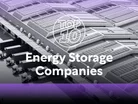Top 10: Energy Storage Companies

Energy storage plays a significant role in the energy transition.
“Energy storage creates a buffer in the power system that can absorb any excess energy in periods when renewables produce more than is required,” the World Economic Forum (WEF) explains.
“This stored energy is then sent back to the grid when supply is limited. It also plays an important role in times of any grid emergency, it can supply the grid with enough power in a short duration to prevent grid failures.”
In light of energy storage’s capabilities and what it enables, the global market is expected to grow six-fold to more than 2TWh by 2030.
So who are the biggest players in the game? We run through the Top 10.
10. NextEra Energy
Revenue: US$25.1bn (2024, TTM)
HQ: Florida, USA
CEO: John W. Ketchum
With 3,000MW of battery storage in operation, NextEra is a giant of the sector.
“As the world’s largest generator of wind and solar energy, NextEra Energy Resources has earned a reputation for excellence and best-in-class development skills,” the company says.
“With our expertise, scale, size and scope of services, we have become a leader in battery energy storage.”
NextEra says battery energy storage is a “promising way to store electrical energy” so demand can be met even at non-peak time.
The company has battery energy storage sites in development and operation in 34 US states, as well as Canada.
CEO John W. Ketchum says: “As renewables grow, so will the demand for near firm battery storage.
“Where the opportunity used to just be limited to California, now it’s spreading across the country.
"Nobody's better positioned to be able to meet that demand than NextEra Energy.”
9. Johnson Controls
Revenue: US$22.2bn (2024, TTM)
HQ: Cork, Ireland
CEO: George R. Oliver
Johnson Controls has established itself as a leader in energy storage through its innovative solutions and strategic initiatives. Its advanced distributed energy storage systems combine lithium-ion batteries with sophisticated software, providing economic and operational benefits to facilities.
Boasting more than a century of experience in batteries and intelligent controls, Johnson Controls integrates cutting-edge technology like ML into its energy solutions.
The company’s expertise extends to developing lithium-ion batteries for vehicles, collaborating with research institutions to optimise energy storage technologies.
Johnson Controls also invests heavily in expanding production capacity for advanced battery technologies, positioning itself at the forefront of the evolving energy storage sector.
“Our customers working on solar or battery storage projects have historically faced challenges with funding and high costs, especially those in the education, healthcare and public housing industries,” says Brandie Williams, Performance Infrastructure Business Development Director, West Region at Johnson Controls.
“We’re proud to showcase how dedicated Johnson Controls is to making efficiency and sustainability accessible for any customer.”
8. Enphase Energy
Revenue: US$2.3bn (2023)
HQ: California, USA
CEO: Badri Kothandaraman
Enphase has established itself as a frontrunner in energy storage, particularly when it comes to residential and small-scale commercial markets.
The company positions energy storage as a long-term investment, supporting customers throughout their energy journey.
The Enphase Energy System integrates solar, batteries and EV charging, empowering users to generate, utilise, store and sell their own energy.
Enphase’s cutting-edge technology, comprehensive energy management solutions and emphasis on reliability and safety have solidified its leadership in the energy storage industry.
Its modular approach allows customers to start small and expand their systems as needed, providing flexibility and future-proofing their energy investments.
7. LG Chem
Revenue: US$37.2bn (2024, TTM)
HQ: Seoul, South Korea
CEO: Hak Cheol Shin
Thanks to its innovative battery technology and strategic initiatives, LG Chem has established itself as a leader in energy storage.
The company — a chemical manufacturer that’s part of LG Corp — has developed advanced lithium-ion batteries for various applications, including EVs and grid-scale energy storage systems.
LG Chem’s expertise in chemical engineering has led to breakthroughs like the safety-reinforced layer that prevents thermal runaway in batteries, enhancing EV safety.
The company's global manufacturing presence and partnerships with major automakers further solidify its market position, alongside its dedication to research and development, which is exemplified by its work on solid-state batteries and other next-generation technologies.
6. Panasonic
Revenue: US$57bn (2024, TTM)
HQ: Osaka, Japan
CEO: Yuki Kusumi
Panasonic has established itself as a frontrunner in the energy storage sector thanks to its diverse and comprehensive range of solutions.
The company's prominence in the industry stems from its cutting-edge battery technology advancements, strategic collaborations and long-standing expertise in producing high-quality products.
To further solidify its place in the battery storage industry, Panasonic established Panasonic Energy in April 2022 as part of the Panasonic Group's switch to an operating company system. This branch of the business provides innovative battery technology-based products and solutions globally and continues to ensure Panasonic’s storage expertise.
Panasonic's battery backup systems empower users with greater control over their grid energy consumption. These systems are engineered to activate automatically, providing instant power to critical loads during outages. Thanks to Panasonic’s technology, the seamless transition is so swift that users are often unaware of power interruptions.
5. CATL
Revenue: US$49.5bn (2024, TTM)
HQ: Fujian province, China
CEO: Zeng Yuqun
Strategic technological innovation and massive investment are just some of the ways CATL has secured its place as a global leader in energy storage.
The company dominates the market and debuted TENER, the world's first mass-producible energy storage system with zero degradation in the first five years of use, in 2024.
“TENER achieves an impressive 6.25MWh capacity in the TEU container, representing a 30% increase in energy density per unit area and a 20% reduction in the overall station footprint, thus enhancing energy density and efficiency through innovative design within a limited space,” the company says.
“CATL’s cutting-edge cell technology supports the outstanding performance of the system. TENER is equipped with long service life and zero-degradation cells tailored for energy storage applications, achieving an energy density of 430Wh/L, an impressive milestone for LFP batteries used in energy storage.”
As well as this, CATL has invested more than US$2.5bn in R&D while generating nearly US$8.2bn in energy storage revenue.
4. Samsung SDI
Revenue: US$13.9bn (2024, TTM)
HQ: Gyeonggi-do, South Korea
CEO: Joo Sun Choi
Manufacturing batteries for IT devices, EVs, power tools and energy storage systems, Samsung SDI — owned by Samsung Electronics — is one of the world’s top tech companies operating in the energy space and also produces electronic materials for displays and semiconductors.
With a focus on Energy Solutions and Electronic Materials, Samsung SDI is one of the world’s leading manufacturers of lithium-ion batteries, underpinning the company’s commitment to facilitating the transition from conventional to renewable energy sources.
Samsung SDI’s innovative energy storage devices play a crucial role in this shift, offering tailored solutions to meet diverse needs across the electric power market.
By developing advanced storage technologies, the company aims to contribute to a cleaner, more sustainable future for the planet.
3. Fluence
Revenue: US$2.7bn (2024, estimated)
HQ: Virginia, USA
CEO: Julian Nebreda
Siemens and AES joint venture Fluence is a top provider of battery energy storage systems for grid and utility-scale applications. Its range of energy storage products — including modular, scalable systems — are designed to be cost-effective and easy to deploy.
Reflecting on Fluence’s market presence while looking ahead, CEO Julain Nebreda says: “We continue to see a very robust market for energy storage, which is enabling the global energy transition to a clean energy grid.
“By manufacturing our own battery modules with domestic content, we expect this will further improve our competitive position and allow us and our customers to benefit from incentives under the Inflation Reduction Act of 2022.”
With energy storage systems deployed globally, Fluence provides grid services, renewable integration and backup power and has 9.4GW of energy storage to its name. As well as this, it has more than 225 energy storage projects scattered across the globe, operating in 47 markets.
On top of leading in the energy storage products and services space, Fluence is a global market leader in cloud-based software for renewables and storage assets, further solidifying its prowess across all areas of energy storage.
2. BYD
Revenue: US$74.3bn (2024, TTM)
HQ: Shenzhen, China
CEO: Wang Chuanfu
Capturing a 30% market share in Europe in the first half of 2024 alone, EV giant BYD is a global leader in battery energy storage. The company’s BatteryBox system has been installed in more than one million homes, establishing BYD’s dominance of the residential storage market.
In 2023, it was estimated that BYD’s energy storage business had an around 40GWh of installed capacity. As well as this, the company is also supplying large-scale energy storage systems, including 1.1GWh for the world’s largest storage project in Chile.
So what’s next for BYD? The company plans to launch its next-generation blade battery in 2025, promising improved range and extended battery life for both electric vehicles and energy storage applications.
BYD says: “BYD energy storage system has features including high safety, long cycle life and low LCOE, it can be used in energy shifting and the provision of peaking capacity, helping to power smoothing and renewable energy curtailment reduction.”
1. Tesla
Revenue: US$96.8bn (2023)
HQ: California, USA
CEO: Elon Musk
A leader in energy storage with products like Powerwall and Megapack, Tesla has significantly grown its energy storage business in recent years.
In 2023, Tesla achieved a record-breaking deployment of 14.7GWh of energy storage systems, more than doubling its installations compared to the previous year.
This surge in deployment has not only bolstered Tesla’s energy storage offering but has led to a significant increase in revenue, with the energy generation and storage segment’s revenue tripling since 2020.
CEO Elon Musk has thrown his weight behind energy storage at Tesla, saying “it won’t be long” before the company’s energy storage business is shipping 100GWh a year.
He adds: “The energy storage business is growing like wildfire, with strong demand for both Megapack and Powerwall.
“For the energy business, that’s doing extremely well. The opportunity ahead is gigantic.”
Explore the latest edition of Energy Digital Magazine and be part of the conversation at our global conference series, Sustainability LIVE.
Discover all our upcoming events and secure your tickets today.
Energy Digital is a BizClik brand
















